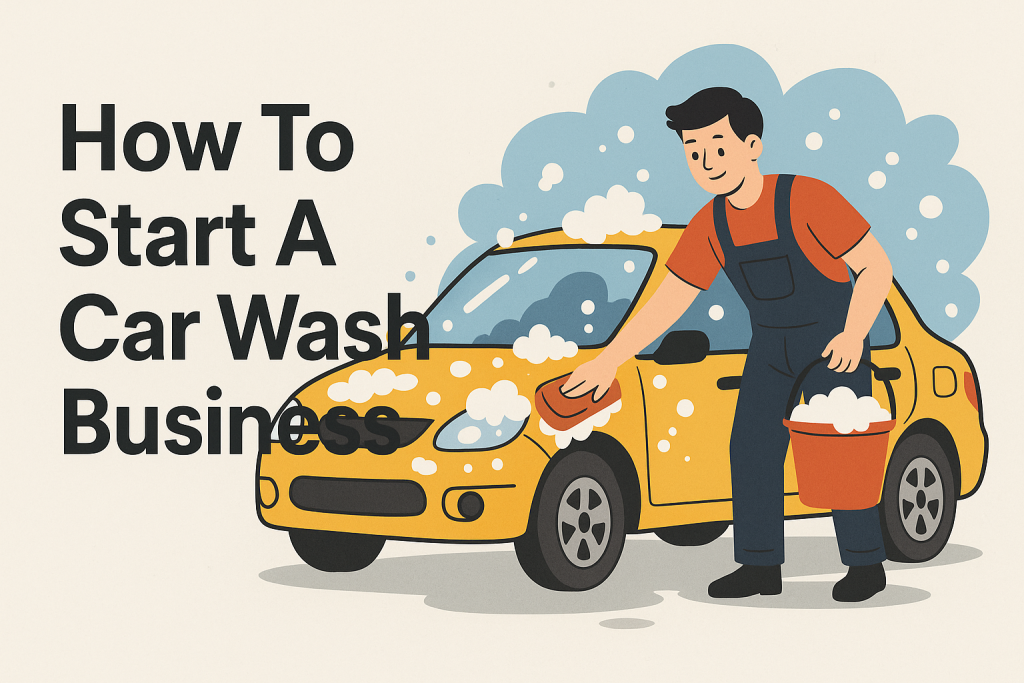North America sees over 2 billion professional vehicle cleanings annually, with 72% of drivers choosing commercial services over home washing. This growing preference creates exceptional opportunities for entrepreneurs seeking stable, service-based ventures. The $15 billion car care sector offers multiple entry points, from express exterior washes to premium detailing studios.
Modern operators benefit from recurring revenue models and diverse service combinations. Automated tunnel systems, self-service bays, and mobile detailing units each cater to different customer needs. Successful owners often combine quick maintenance options with add-on services like interior sanitization or ceramic coatings.
Launching requires careful planning around location selection, equipment investments, and local regulations. High-traffic areas near shopping centers or gas stations typically perform best. Many states mandate water reclamation systems, influencing startup costs between $250,000-$500,000 for full-scale operations.
This guide explores practical strategies to establish a competitive presence. You’ll learn to analyze local demand, choose suitable equipment packages, and implement loyalty programs that keep vehicles returning. With proper execution, car care enterprises can achieve 20-35% profit margins while becoming neighborhood staples.
Key Takeaways
- Professional vehicle cleaning serves 72% of US drivers annually
- Multiple business models exist, from automated tunnels to mobile units
- Startup costs vary widely based on services and location
- Site selection impacts visibility and customer accessibility
- Environmental regulations affect equipment choices
- Membership programs drive repeat business
- Premium add-ons increase average transaction values
Introduction
Starting a successful car wash venture requires careful planning and understanding of the industry fundamentals. If you’re wondering how to start my own car wash business, the first step is conducting thorough market research in your target area. Understanding your local competition, traffic patterns, and demographic data will help you make informed decisions about location and service offerings.
Many entrepreneurs choose to open carwash facilities in high-traffic locations near shopping centers or busy intersections. The visibility and accessibility of your location can make or break your business, so take time to analyze potential sites carefully. Consider factors like ease of entry and exit, proximity to complementary businesses, and the overall convenience for your target customers.
When evaluating different business models, the self service car wash startup cost is typically lower than full-service options, making it an attractive entry point for new business owners. Self-service bays allow customers to wash their own vehicles using your equipment, which reduces labor costs and operational complexity while still providing steady revenue streams.
Before you begin operations, it’s crucial to understand what do i need to open car wash business – this includes securing proper permits and licenses, obtaining adequate insurance coverage, purchasing professional-grade equipment, ensuring reliable water and electrical connections, and developing a solid marketing strategy. Each of these elements plays a vital role in establishing a legitimate and profitable car wash operation that can serve your community for years to come.
With over 280 million registered vehicles cruising American roads, professional cleaning services have become essential for time-strapped drivers. The average household now prioritizes convenience, fueling demand for quality care that preserves vehicle value.
Overview of the Car Wash Industry
Modern operations cater to diverse needs through three primary models: express tunnels for 10-minute cleanings, self-service bays for hands-on owners, and mobile units offering doorstep detailing. Services range from $5 basic exterior rinses to $300+ premium packages featuring ceramic coatings and fabric protection. “Consistent quality builds repeat customers,” notes a Texas-based operator, emphasizing the sector’s reliance on trust. For a step-by-step approach to launching a seasonal business, explore our guide on how to start a summer camp, packed with practical tips and planning insights.
Why Starting a Car Wash Can Be Lucrative
Recurring revenue drives profitability, with regular clients visiting every 2-4 weeks. Operators boost margins through upselling – 42% of customers add interior cleaning when prompted. Membership programs lock in long-term income, while seasonal services like undercarriage washes during winter months address specific regional needs.
Understanding the Car Wash Industry Landscape
Vehicle owners across America now spend $13 billion annually maintaining their rides’ appearance. This thriving sector rewards operators who match service types to local preferences and emerging trends. Three distinct models dominate modern operations, each appealing to specific customer priorities.
Market Shifts and Regional Opportunities
Urban areas show 40% higher demand for express tunnels compared to rural markets. “Drivers want quick, consistent results,” explains a Florida operator, noting membership programs now account for 58% of their revenue. Eco-conscious practices like water recycling systems attract environmentally aware clients while cutting utility costs.
Premium add-ons boost profits significantly – ceramic coatings alone add $150+ per service. Seasonal variations matter too: Midwest locations see 70% winter demand for undercarriage cleaning, while Southwest operators focus on UV-protectant treatments.
Service Models Driving Growth
Automated facilities lead in volume, processing 120+ cars hourly through conveyor systems. Roll-over units work well in tight spaces, serving 25-30 vehicles daily. Full-service operations thrive by offering interior detailing and paint correction, often charging triple basic wash rates.
Self-service bays remain popular for their affordability and flexibility. These spots attract weekend warriors and budget-focused drivers, generating steady income through coin-operated equipment.
“Our regulars treat it like a hobby – they’ll spend hours perfecting their ride,”
shares a Michigan owner.
Hybrid models combining automated speed with hand-finishing touches are gaining traction. Successful businesses often mix core offerings with niche services like pet hair removal or headlight restoration to stand out in competitive markets. If you’re exploring ways to build a digital income stream, our guide on how to start a blog and make money offers a practical roadmap to get you started.
Detailed Business Planning and Feasibility
Crafting a winning strategy begins with a rock-solid blueprint. Your vehicle care venture’s success hinges on transforming ideas into actionable steps through careful documentation.
Learning how to invest in car wash opportunities and how to start a car washing business requires understanding the car was business (commonly misspelled) or car wash buisness fundamentals, planning your car wash start up carefully, discovering how do i start a car wash business and how to start your own car wash with proper market research,
navigating opening a car wash and opening a car wash business requirements including permits and equipment, successfully opening up a car wash by starting a carwash with either full-service or starting a self service car wash options, and ultimately starting car wash business ventures with adequate funding and strategic location selection.
-
For those dreaming of becoming a florist, learning how to build a flower business step by step can set you on the right path.
Steps to Develop a Robust Business Plan
A strong financial roadmap starts with an executive summary. Highlight your unique approach – maybe rapid-service tunnels or eco-friendly mobile units. Include target demographics and projected growth rates based on local vehicle counts.
Market analysis separates dreamers from doers. Study existing competitors within a 5-mile radius. Track traffic patterns near potential sites. “We mapped morning commuter routes to position our express wash,” shares a Colorado operator. This data shapes pricing strategies and service bundles.
Entrepreneurs exploring automotive services often research car wash business ideas to identify profitable niches and service models in their local markets. Understanding how to open your own car wash business and how to start the process of setting up a car wash business helps aspiring owners plan comprehensive launch strategies.
Service models include business car wash operations and carwashing business approaches that cater to different customer segments and market demands. Equipment planning involves equipment needed to start a car wash business and how to set up car wash business with proper facility design.
Budget-conscious entrepreneurs ask how to start a car wash business with no money through creative financing and partnership opportunities. Specialized services include how to start an automatic car wash business and how to start up a car wash business with modern technology integration.
Operational management covers running a car wash and car wash management for sustainable daily operations. Facility development includes how to build car wash infrastructure and how to open a carwash with proper permits and licensing.
Business ownership involves how to own a car wash business and how to run a car wash business with effective management systems. Setup processes include how to set up a car wash business and how to start a self car wash business for automated operations.
Implementation includes how to start carwash business and how to start up a car wash with proper planning and execution. Facility establishment covers opening car wash operations and setting up a car wash business with comprehensive business planning.
Business development includes starting a car washing business and starting a carwash business with sustainable growth strategies. Basic requirements involve what you need to open a car wash including permits, equipment, location, and operational planning for successful automotive service business operations.
Financial projections demand precision. Break down equipment costs, chemical expenses, and staffing needs. Account for seasonal dips – December revenues often drop 30% in snowy regions. A Detroit owner notes:
“Our break-even analysis saved us from overspending during slow months.”
Operational details matter. Outline staff training protocols and maintenance schedules. Describe loyalty programs to boost repeat visits. Address risks like equipment failures or permit delays.
This document becomes your financial passport. Lenders review it to assess repayment capabilities. Business plans using industry templates show professionalism while ensuring no critical information gets overlooked. Update it quarterly as you gather real-world money management insights.
When starting a car wash business, learning how to start a carwash business and how to start car wash business requires careful planning to build a carwash or build car wash facility, establishing a successful car washing business by understanding how to open a car wash and the process of opening a carwash, determining what do you need to open a car wash and what do you need to start a car wash including permits and equipment, planning building a car wash bay or building a carwash from scratch,
meeting car wash business requirements and managing car wash startup logistics with realistic car wash startup costs, launching your carwash business by knowing how to build a car wash and how to build a car wash business strategically, discovering how to open a car wash business profitably, mastering how to run a car wash efficiently, and ultimately understanding how to start a carwash with proper funding and location selection.
Learning the process to start a car wash business and how to start car washing business requires careful planning for owning a car wash business, whether establishing a hand car wash business or discovering how to own a car wash and how to start a self-service car wash with automated equipment, designing your car wash set up and car washing business setup with proper drainage and equipment, understanding
How to open car wash business and how to open up a car wash with necessary permits, mastering how to start a hand car wash business for lower startup costs or how to start a self serve car wash for passive income, taking steps on how to start your own car wash business successfully, and determining what do you need for a car wash business including location, water access, environmental permits, equipment, and adequate funding.
How To Start A Car Wash Business
Launching a successful vehicle care operation requires methodical execution of critical steps. Industry leaders emphasize thorough preparation across ten key phases, each building upon the last to create sustainable foundations.
Core Implementation Stages
| Phase | Key Actions | Time Estimate |
|---|---|---|
| Location Selection | 25k+ daily traffic analysis Competition mapping |
2-6 months |
| Legal Setup | Business registration Permit acquisition |
4-12 weeks |
| Site Development | Zoning approvals Construction oversight |
6-9 months |
Location hunting dominates early efforts. Target areas near grocery stores or fuel stations with proven commuter patterns. One Ohio operator shares:
“We tested three sites with traffic counters before committing – the data doesn’t lie.”
Structural decisions impact long-term flexibility. LLC formations protect personal assets while franchise partnerships offer brand recognition. Research trips reveal operational secrets – note equipment layouts and customer flow during site visits.
Financial planning separates thriving operations from struggling startups. Secure funding before breaking ground, as 68% of delays stem from cash flow issues. Marketing launches should coincide with construction completion, using preview discounts to build buzz.
Setting Up Your Car Wash Business Legally
Navigating legal requirements forms the foundation for long-term success in vehicle care services. Proper structuring shields personal assets while ensuring compliance with environmental and operational regulations.
Entity Selection Essentials
Choosing the right legal structure impacts taxes and liability protection. LLCs dominate the industry, offering:
- Pass-through taxation options
- Simplified annual reporting
- Personal asset safeguards
| Entity | Benefits | Best For |
|---|---|---|
| LLC | Flexible management Low paperwork |
Most wash businesses |
| S-Corp | Salary/dividend splits Tax savings |
High-revenue operations |
| C-Corp | Investor readiness Stock options |
Franchise expansions |
More complex structures like S-Corps suit owners planning rapid growth. “We switched to S-Corp status after hitting $500k revenue,” shares a Florida operator. Consult a tax professional to match entity choice with financial goals.
Compliance and Protection Measures
Local governments enforce strict rules for water runoff and chemical use. Common permits include:
- Wastewater discharge authorization
- Hazardous material storage permits
- Signage approvals
Insurance packages should address industry-specific risks. General liability covers slip-and-fall incidents, while workers’ comp protects staff handling equipment. Environmental impairment policies prove vital for wash businesses using industrial cleaners.
“Our city required three separate inspections before granting operational approval – start permit applications early.”
Financing Your Car Wash Venture
Securing proper funding separates thriving vehicle care operations from those stuck in neutral. Upfront investments for machinery and site prep often surprise new owners. Smart financial planning helps navigate these initial hurdles while building sustainable cash flow.
Exploring SBA Loans, Term Loans, and Equipment Financing
The Small Business Administration offers three primary solutions for service providers. Their 7(a) program covers everything from conveyor systems to property purchases:
| Loan Type | Max Amount | Best Use |
|---|---|---|
| 7(a) | $5M | Equipment + facilities |
| 504/CDC | $5.5M | Heavy machinery |
| Microloan | $50k | Startup costs |
Established operators favor term loans for predictable payments. “We refinanced with a 7-year term loan after two profitable seasons,” shares a Georgia owner. New ventures often use equipment financing – lenders accept sprayers and dryers as collateral.
Separating Business Finances and Finding the Right Credit Options
Mixing personal and company funds causes tax headaches. Open dedicated accounts before your first transaction. This builds credit history for future expansions.
Strong candidates consider:
- Business credit cards with rewards programs
- Lines of credit for seasonal fluctuations
- Vendor payment plans for detergent supplies
“Apply for financing three months before equipment delivery – approvals take longer than you’d think.”
Regularly review banking relationships as revenue grows. Many owners upgrade to premium credit options after hitting annual revenue milestones.
When planning for succession or estate transfer, it’s worth examining the unique advantages of using a business trust as part of your strategy.
Location, Layout, and Equipment Essentials
Strategic positioning separates thriving operations from struggling startups. One Arizona operator puts it bluntly: “You can’t fix bad geography with great marketing.” Prime spots combine visibility with convenience, turning passing drivers into loyal clients.
Traffic Patterns and Site Selection
Target areas seeing 25,000+ daily vehicles near shopping hubs or major intersections. Full-service models need 10,000 residents within one mile – check census data and morning commute routes. Avoid locations with existing competitors closer than 5,000 feet.
Corner lots with dual road access outperform hidden plazas. A Nebraska owner shares:
“Our angled entrance lets drivers queue without blocking traffic – that design detail added 23% more daily washes.”
Machinery and Maintenance Must-Haves
Automated tunnels require conveyor systems ($150k-$300k) and programmable controllers. Self-service bays need durable pressure washers ($8k-$15k) and payment kiosks. All models benefit from water reclamation systems – they cut usage by 60% while meeting environmental regulations.
Chemical selection impacts results. Pre-soak solutions loosen grime before contact. pH-neutral shampoos protect paint, while wheel cleaners tackle brake dust. Microfiber towels prevent swirl marks during hand-drying.
Regular equipment checks prevent downtime. Schedule monthly nozzle inspections and quarterly pump maintenance. Track chemical inventory to avoid service interruptions during peak hours.
Operational Workflow and Service Offerings
Efficient operations separate thriving vehicle care providers from average performers. Smart operators design workflows that balance speed with quality, creating experiences that turn first-time visitors into regulars.
Automated Versus Full-Service Options
Automated systems excel at handling high volumes – some process 100+ vehicles hourly. These setups require minimal staff but demand significant upfront investment. Customers appreciate the 10-minute turnaround for basic exterior cleaning.
Full-service models cater to detail-oriented clients. Teams perform hand-drying, interior vacuuming, and specialty treatments. While labor costs run higher, these services command premium pricing. Many locations combine both approaches, using automation for speed while offering add-ons for personalized care.
Successful operators track local preferences through loyalty programs. Urban sites often favor quick exterior washes, while suburban locations see stronger demand for complete packages. “Our ceramic coating upgrade gets chosen by 1 in 5 automated wash users,” notes a California owner.
Regular equipment maintenance ensures consistent results across all service tiers. Weekly nozzle checks and chemical balance tests prevent quality dips that drive customers elsewhere. Those mastering workflow efficiency often achieve 25% higher repeat rates than competitors.







